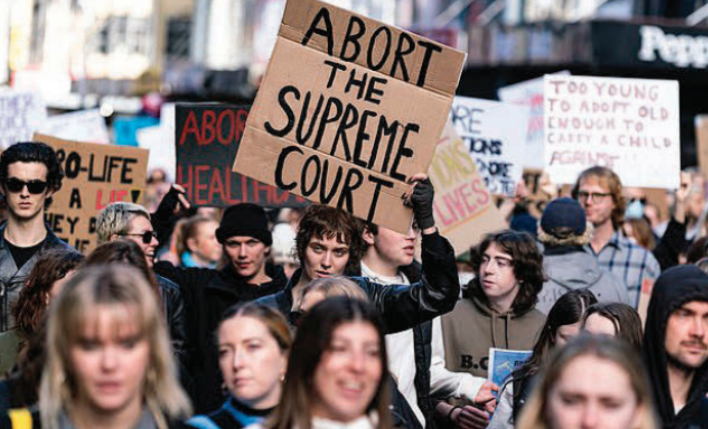
With Roe v. Wade overturned, reproductive rights are more important than ever
By Bridget Gum-Egan
This summer has been a very frustrating and confusing time for the political climate of the United States. We now have a 6-3 conservative majority in the Supreme Court, three of which were appointed by former President Trump. This unequal political climate has caused the Supreme Court to pass laws that would be considered more conservative, including the overturning of Roe v. Wade. The decision to declare the right to an abortion as unconstitutional has far-reaching implications in our society.
In response to this decision, everyone has had different reactions. Some celebrated, but many protested because they previously had protection and access to a medical service for almost 50 years. While an issue like this one should theoretically affect everyone, it is important to know who will be hit the hardest. For example, some people believe that abortion access is solely a women’s rights issue, but it affects anyone who gets their period. By framing this problem from only one perspective, it is not only exclusionary, but we also forget to give other people the opportunity to speak about an issue that affects them. Another problem is that people of color will be disproportionately affected by these bans because they are more likely to obtain abortions, have limited access to health care, and typically have less access and resources that would enable them to travel somewhere to get an abortion, according to Kaiser Family Foundation (KFF), a nonprofit focused on national health issues.
After documents from the Supreme Court had been leaked on the internet, many people had a feeling that Roe v. Wade was going to be overturned. In preparation, many conservative states had laws on the docket to immediately come into effect after the decision had been made. According to the Center for Reproductive Rights, 11 states have made abortion illegal, which has criminalized anyone who takes part in getting an abortion, four states and territories do not protect access to abortion, and 16 states and territories are classified as “hostile,” meaning that there are laws in place that restrict or prohibit access to abortion. Most of these laws put in place to ban abortion also have no exemption or special circumstances cases, meaning there are no abortions allowed, even in the case of rape, incest or medical emergency.
Abortion access isn’t as simple as just not being able to have an abortion. Given these restrictions based on the individual state, those who may want or need to have an abortion will have to travel to a state that allows them to do so. This pattern will put a financial strain on the states that protect abortion, as well as a resource strain because there will most likely be overbooking and increased waiting times. The strain could be potentially dangerous for individuals who need abortions. Maternal mortality is a serious problem during pregnancy and childbirth to this day, even in developed countries. Unfortunately, because of these bans, the estimated maternal mortality rate would be 24%, up 14% from 2017.
To make the situation even worse, there are other rights that could be under attack soon. After Roe v. Wade was overturned, Clarence Thomas, a conservative Supreme Court justice who voted to overturn Roe, wrote his opinion on the law and other laws he believes should be re-evaluated. These laws include the access to contraceptives, the legality of same-sex relations and marriage and interracial marriages. As of July, the House passed a bill to make access to contraceptives a federal right; however, it faces slim chances in the Senate because it does not have a lot of Republican support. In July, the House also passed the Respect for Marriage Act, which protects same-sex and interracial marriages. Since this bill passed with significant Republican support, it is predicted that it will also pass in the Senate.
Ultimately, the conservative majority in the Supreme Court is a big concern for many minority groups in the United States and can make their lives much more challenging. It is important to respect people’s individual rights and choices, especially when it doesn’t impact or affect anyone else’s life. Freedom and equality are the ideals on which the United States was founded, and when individual rights begin to be taken away, it makes you question the values of the country.
Bridget Gum-Egan
junior English major



